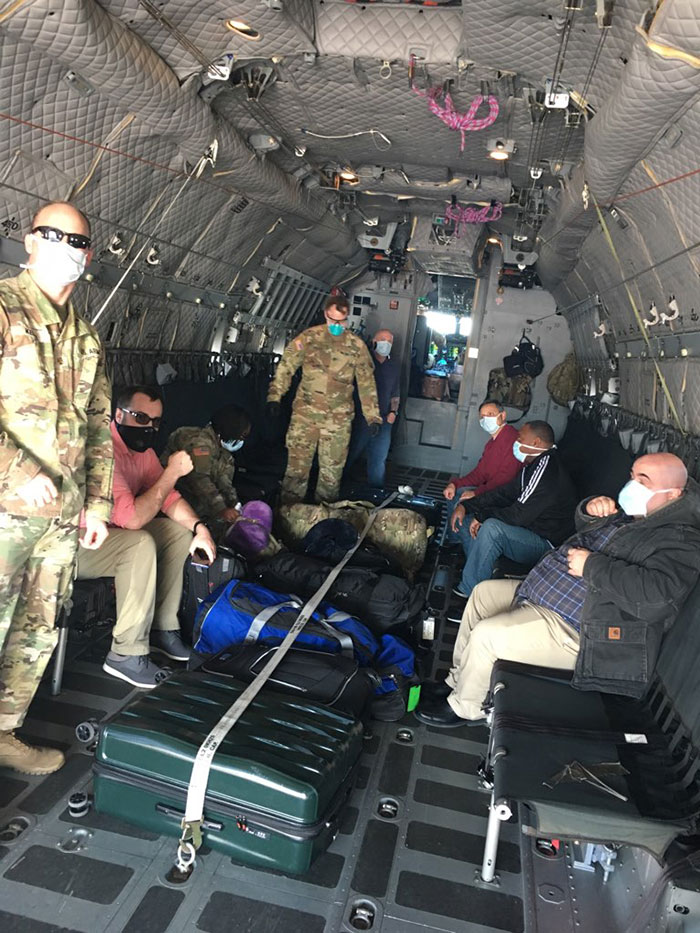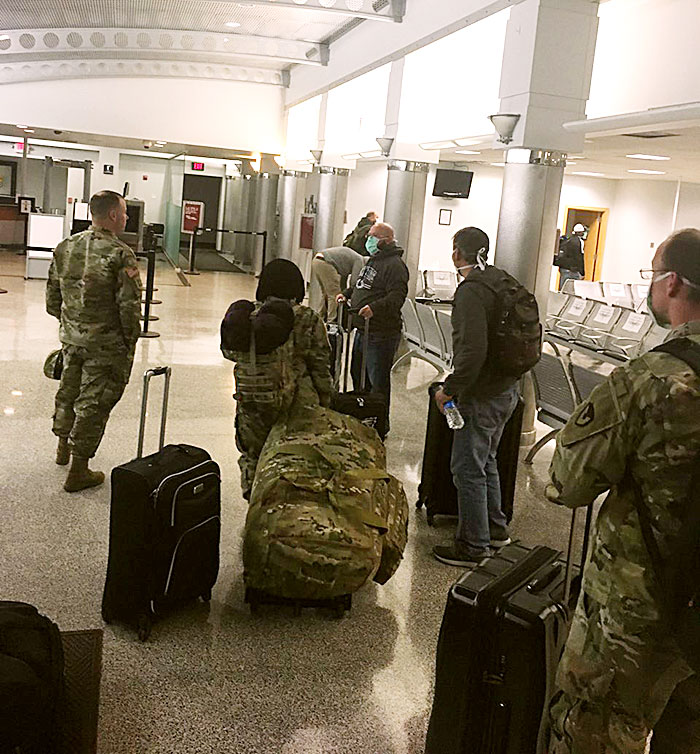Force Sustainment Directorate team assists in COVID-19 effort

An unprecedented time typically calls for unprecedented measures. However, when it comes to protecting our nation, the U.S. Army Medical Materiel Development Activity at Fort Detrick, Maryland, always stands ready to act quickly in providing the necessary medical solutions and resources needed for the fight – even if the enemy is a threat unseen.
Earlier this year, the world witnessed the spread of Coronavirus Disease 2019, better known as COVID-19, a potentially fatal illness that has already affected more than 3.8 million people worldwide. Even before it reached the continental U.S., our military was preparing for a battle unlike any other seen before. As part of this counterattack, the men and women of USAMMDA were immediately called into action as part of the country's swift response, and a group of individuals from the Force Sustainment Directorate were among the first to serve in the effort.
Recently transitioned from the U.S. Army Medical Material Agency, the FSD team is responsible for the wholesale procurement, production, fielding, sustainment, and recovery of medical sets, kits and outfits, as well as individual medical equipment items for the Army's medical force and nonmedical units with medical requirements. In a nutshell, the group builds, distributes, and fields medical assemblages and equipment, and provides operational support of the Army's medical units to help ensure combat-ready forces both in peacetime and during conflicts.
On March 29, the FSD group received notice of a critical temporary duty assignment to pack out two field hospitals in response to the COVID-19 threat. Within hours, seven personnel were on a plane traveling to Sierra Army Depot in Herlong, California. This group included three members of USAMMDA's FSD Medical Logistics Support Team, Paul Flemings, Robert Pringle, and Rick Bower; two contractors, James Crain and Brandon Edwards; and two Soldiers from USAMMA, Army. Maj. Craig Keech and Staff Sgt. Brenda Kingvickers. The three MLST members – Flemings, Pringle, and Bower – are all retired Army Soldiers with decades of logistics experience between them.
"We were called to fly to California to pack up two field hospitals and get them ready for whoever may need them, most likely a Reserve Unit for future use to support the COVID-19 effort nationwide," explained Bower. "The hospitals are packed and ready to go, but the maintenance equipment such as ventilators, suction devices and thermometers are stored on shelves in the warehouse because maintenance technicians must do routine service on these items to make sure they remain fully functional. We went out and quickly pulled all of the maintenance equipment and placed these inside the containers with the other expendables and durable supplies."

When asked about the safety measures taken at the depot, Bower said he was very impressed with the thoroughness shown by the staff. As soon as they arrived on site, the group was met by a safety inspector who gave them a briefing on the COVID-19 precautions, and they were provided with masks and gloves to be used at all times.
Although the duration of the team's initial mission was unspecified, they continued working at Sierra through April 21. Shortly after their arrival there, the group received two additional missions to pull and prepare ventilators for shipping: 150 units for the first assignment, and another 143 ventilators to complete the second task.
Bower complimented the work of various organizations at the Sierra Army Depot, and he said their help was instrumental in the success of the mission. He praised John McKeand, Sierra's Command and Control Cell supervisor, and his staff for their assistance during their stay, stating, "He and his team were always just a phone call away and responded within minutes whenever we needed them."
"When it was time for the ventilators to move, we contacted John and he was out there with his team within five minutes," said Bower. "Within one hour after receiving word of the mission to pull the 150 ventilators, we had all of them pulled and on pallets, ready to go. And then John and his team packed them up right away. Within hours, the truck carrying them was leaving and heading to Travis Air Force Base."
Many would agree this single example may serve as the textbook definition of "quick response."
"I am so proud of this team of unsung heroes," said Army Col. Gina Adam, USAMMDA commander. "The medical units who deploy to different parts of the United States to support the COVID-19 response need medical equipment, and this team did not hesitate to spend weeks at the depot getting that critical equipment packed and ready to go."
For now, Bower and the rest of the response team are back at their normal stations, although they remain on standby in case new orders arrive to pack up and ship other medical equipment to support the COVID-19 effort.
"Now it is a case of 'wait and see,' as some states may begin to reopen their economy structure again," said Bower. "We have to see what happens in the near future. With any luck, we won't be needed for this COVID-19 crisis, but we're always ready for anything."
Bowers' words clearly echo the sentiment of the entire organization. The men and women of USAMMDA stand ready to do what is asked of them, by the leadership of the command and of the nation.
"We've done this before, with situations like Hurricane Katrina down south, and with the hurricane relief effort in Puerto Rico – we've done it in combat zones – wherever we're needed," said Bower.
And when he says "wherever we're needed," Bower means this. In fact, he illustrated it quite convincingly when he mentioned an act of kindness offered by members of the response team during downtime near their hotel in Reno, Nevada. Finishing their morning exercise routine, Bowers, Flemings and Kingvickers came across a homeless encampment not far from the hotel, and they quickly decided to supply the residents with bottled water and trays of pizza.
Without hesitation, the team saw others in need and rushed to help them – which should support the idea that our organization's mission goes well beyond the battlefield, or our nation's borders. It goes right to the heart of every member of the team. USAMMDA stands ready to support anyone who may be in need – anyone, anywhere, at any time.
As shown by the members of our FSD response team, it's more than a mission. It's a promise.
USAMMDA is a subordinate command of the U.S. Army Medical Research and Development Command, under the Army Futures Command. USAMRDC is leading research efforts to Prevent, Detect and Treat COVID-19. The Walter Reed Army Institute of Research, the U.S. Army Medical Research Institute of Infectious Diseases, the U.S. Army Institute of Surgical Research, the U.S. Army Aeromedical Research Lab and the U.S. Army Medical Materiel Development Activity are applying existing field-leading research capabilities, a global research network, and established partnerships with industry and academia to support the Whole-of-Government response to COVID-19.













